The future of the Franco-German tandem
Following the victories of François Hollande in the presidential election and the Socialist Party in the parliamentary election, the existing model of relations between Germany and France as symbolised by the Merkel-Sarkozy duo is undergoing a transformation.
Along with the defeat for Sarkozy, who had fostered close cooperation with the German Chancellor, we are witnessing a change in the German-French modus operandi, which was based on making confidential agreements concerning the anti-crisis measures in the eurozone and then presenting ready-made solutions to other EU members (as in the case of the successive versions of the document currently known as the fiscal pact).
However, a conflict in bilateral relations, which would mean a total breakdown of the Franco-German engine, is rather unlikely. In fact, François Hollande's proposals have diminished the appearance of the two states’ exceptional compatibility, and have restored the specific relationship affected by the natural rivalry between two states, who because of their economies' different orientation have divergent interests. Nevertheless, both sides are destined to reach a compromise, as neither can attain its goals in the face of the other's opposition. In the long term, Hollande is likely to maintain a common front with Germany in fighting the crisis, while at the same time trying (with his allies from the south of the EU) to limit Berlin’s political and economic superiority.
Two strategies for fighting the crisis
During the presidential campaign in France, Chancellor Angela Merkel openly supported Nicolas Sarkozy[1]. Merkel and Sarkozy were united by their vision of how to tackle the crisis in the eurozone. The Chancellor supported the structural reforms announced by Sarkozy, which envisaged a programme of spending cuts according to the German model. Sarkozy's re-election would have reinforced this decision-making model in the EU, where Paris and Berlin make the most important decisions, with some assistance from the eurozone states. It is worth noting, however, that during a long period of his presidency Sarkozy opposed Merkel on most issues regarding the anti-crisis measures. What made him change his mind was fear of the unpredictable reactions of the markets, of a further downgrading of France’s credit rating, and of losing support in the opinion polls. The close coordination between Paris and Berlin before the successive EU summits seemed to be calming the moods on stock exchanges.
The new French President François Hollande has partially altered the policy of his predecessor. To be more precise, he has actually returned to the style of Sarkozy's policies before France lost its highest credit rating. The change affected both bilateral relations with Germany and policy within the EU. President Hollande insisted that the fiscal pact be completed with provisions for growth-stimulating mechanisms. In practice, this would not only result in a commitment to cut costs, but would also permit loans to be taken that could be used for investing in the countries in crisis, and increase their access to funds. The €120-billion 'growth package' proposed by Hollande in his letter to the EU leaders would be financed from three sources: €55 billion from unused structural funds (redistributing the funds originally intended for the new EU members would be an unprecedented move), €60 billion from the European Investment Bank, and €4.5 billion from bonds issued to finance structural projects (the so-called project bonds).
Germany strongly opposes the issue of Eurobonds, which would be guaranteed by all the eurozone states, and would thus be more accessible and cheaper for the countries threatened by the crisis. However, Eurobonds would simultaneously increase the cost of obtaining funds for Germany. Berlin will only agree to the issue of so-called project bonds, which would be used for infrastructural investments. However, this is not enough for France, which wants access to the cheapest loans in order to reduce the risk of speculation and lower the debt cost differences among the eurozone states[2].
At the informal EU summit in Brussels on 23 May, Angela Merkel argued that Eurobonds are incompatible with the acquis and will not contribute to growth, possibly only temporarily masking the crisis (which will return sooner or later, due to some states' inefficient financial systems).
Another sticking point concerns the methods for granting support to the banking sector. The French proposal envisages the possibility of directly recapitalising banks from the European Stability Mechanism (ESM) with capital of €500 billion euros. Germany opposes this proposal, and argues that supporting banks from the ESM alone, without the involvement of the national budgets, will not motivate those governments to implement reforms. According to Hollande’s proposal, the ESM reserves should be replenished by the European Central Bank (the ESM would be granted a banking license, and could incur loans in the ECB).
In mid-June, in response to the stance adopted by Paris, Chancellor Merkel publicly criticised the policy of the French government for the first time, accusing it of not helping to counteract the crisis[3]. Germany is concerned with the changes which the left-wing French government has introduced into its domestic economic policy and which increase expenditure, such as lowering the retirement age to 60 (although Hollande keeps promising to reduce the budget deficit).
A reconfiguration of alliances
Hollande’s strategy involves departing from the close coordination of action exclusively with the Germans while ignoring the remaining EU members, as was demonstrated by the president-elect’s meeting with Mariano Rajoy, Spain’s right-wing Prime Minister. The two politicians met before the informal EU summit of 23 May and travelled from Paris to Brussels together by train. In order to put pressure on the Germans, the French leader has established a close cooperation with Spain and Italy, who have expressed their support for Hollande’s proposals. France's position was also supported by the European Commission (which backed the idea of jointly guaranteed Eurobonds), as well as the International Monetary Fund, which urged to immediately counteract the panic on the financial markets.
At the same time, Hollande is looking for allies on the German domestic scene. He has good relations with the opposition Social Democratic Party (SPD), whose leaders he invited to a meeting in Paris on 13 June. This could be seen as a demonstration that Angela Merkel’s government is not his only German partner in the talks. In an interview for the Financial Times on 24 June, Sigmar Gabriel, one of the Social Democrats’ leaders and a possible rival to Angela Merkel in next year's elections, supported the introduction of mechanisms that would reduce the costs of debts incurred by the eurozone states, thus meeting the expectations of France and Italy. He also endorsed the agreement on the growth strategy, but objected to Eurobonds, arguing that they are incompatible with the German constitution.
Back to the old sticking points in the Franco-German relations
In the long term, the relations between Merkel and Hollande will not be shaped solely by the anti-crisis policies. There are many areas where both states have had a completely divergent positions for years; but the priority of fighting the financial crisis has made these issues secondary in the public debate. However, they did affect the dynamics of Franco-German relations even during Sarkozy's term of office.
During the European Council session on 28-29 June, François Hollande unexpectedly sabotaged the German plan to appoint Wolfgang Schäuble, Germany's minister of finance, as president of the Eurogroup. A week before the summit, France indicated that it would put up its own candidate for this position, the finance minister Pierre Moscovici. Germany was forced to withdraw Schäuble’s candidature, and ultimately Jean-Claude Juncker, the current head of the eurozone finance ministers’ group, retained his position. However, Germany has lost in this personal dispute: in order to boost Schäuble’s chances of taking over leadership of the Eurogroup, Berlin decided not to seek the re-election of Thomas Mirow as head of the European Bank for Reconstruction and Development. In a very similar manner, France managed in early 2012 to block the appointment of Joerg Asmussen to the position of the ECB's chief economist, putting up its own contender at the last moment.
Moreover, François Hollande's first decisions in the sphere of security and defence have also caused consternation in Berlin: Hollande has announced the withdrawal of French troops from Afghanistan (in the election campaign he pledged to withdraw troops by the end of 2012, and not by the end of 2014, like the remaining states). Before the NATO summit in Chicago, the German minister of defence Thomas de Maiziere appealed to Hollande to change his stance, but the latter merely toned down his declarations. Berlin was much more alarmed by the French president's suggestion made on 30 May regarding the possibility of a military intervention in Syria. Germany was surprised by Hollande's statement, as it had been by Sarkozy’s earlier efforts to build a coalition to attack Libya.
Hollande’s predecessor has also left him with a German-French conflict in EADS, the European armaments corporation, that has been brewing since at least the end of President Jacques Chirac’s term. The rivalry between managers from Germany and France for the decisive voice in the company is far more than just a matter of prestige. Berlin is (rightly) concerned that if the French prevail, then defence factories located in Germany will lose their importance, employees may be laid off, and Germany may be cut off from new technologies[4].
It should be noted that the 'Merkozy' duo proved successful in solving problems of EU economic policy, although this did not keep Sarkozy from competing with Merkel even in this sphere, especially in personal matters. In other fields, however, the duo was much less serene. Sarkozy tried to compensate for his dependence on Angela Merkel in EU financial policy by demonstrating his autonomy and attempts to shape the EU's position on other issues. For example, in 2009, during the NATO summit in Strasbourg commemorating the 60th anniversary of the North Atlantic Treaty, Nicolas Sarkozy announced his country's return to the integrated military structures of NATO. The negotiations regarding this return had been conducted exclusively with Washington and London. Some German experts interpreted this as a sign of disrespect for Berlin, and a desire to keep Germany in the second division when it comes to security and defence policy issues[5]. Likewise, the intervention in Libya performed by France and Britain led to the temporary isolation of Germany in the West, and triggered a domestic discussion very similar to the one that swept through Germany in 1991 during the intervention in Iraq[6].
Another point of contention has been nuclear power. In September 2007, during a meeting between Merkel and Sarkozy in Meseberg, the then French president stated that his country perceives nuclear power as the energy of the future, and he could not imagine Germans going the other way. An indirect response was given to him by Sigmar Gabriel, Germany's then environment minister; in an interview for the Tagesspiegel daily, Gabriel said that nuclear power belonged to the past. The situation became even more complicated when in June 2011, following the nuclear plant accident in Fukushima, Germany decided to abandon nuclear energy completely. Even though Hollande promised to close two reactors at the Fessenheim power plant in Alsace during his five-year term of office, this is as much as can be expected, since 75% of the electricity consumed in France comes from nuclear energy[7].
Different visions of Europe
At the root of the German-French dispute lie differences in their vision of the European Union’s future shape. These differences, for their part, result from these countries’ specific definition of their identity, role and interests in the world. Germany is convinced that the only way out of the crisis and of avoiding it in the future is to strengthen European integration by establishing a strong political union. This would guarantee the efficiency of a fiscal and banking union. The political union would strengthen the competences of the EU institutions, including the Commission and the European Parliament. Germany has presented its detailed proposals on several different occasions. During the ruling CDU party's congress in November 2011, the proposals presented included electing the head of the Commission by a popular vote by all citizens of the EU states, and a bicameral parliament, with an lower chamber elected by universal suffrage (as the European Parliament is currently elected), and an upper chamber made up of representatives of the member states’ governments[8].
Both chambers would have the right of legislative initiative. Given Germany's population, political and economic potential, implementing such proposals could translate into the strengthening of Berlin’s influence on decision-making processes in the EU. German finance minister Wolfgang Schäuble, upon receiving the Charlemagne Prize in May 2012, expressed his support for the direct election of the EU President. He also appealed for further political integration and the reform of the EU institutions. According to the minister, the democratic legitimacy of European institutions must be strengthened through the direct election of the EU President, who would become the political head of the EU executive, i.e. the transformed European Commission. He also repeated his appeal for the bicameral European Parliament to be granted the right of legislative initiative. These proposals were also included in a report by the so-called group for the future of the European Union, published on 19 June (the group consists of the foreign ministers of ten EU states, and its informal meetings were initiated by Guido Westerwelle).
The proposal to transfer more power to the EU institutions has been very strongly criticised in France, which traditionally favours the intergovernmental model of governance in the EU and the strengthening of national governments in the decision-making process. It should be noted that when it speaks of ‘national governments’, France means the major EU countries, without regard to the Central European states. Moreover, Gaullist ideas are still strongly rooted in the outlook of the French political class, that is, opposition to the federalisation of Europe and the transfer of too many powers to the EU institutions[9].Such views are shared by an influential group within the ruling Socialist Party, which includes the foreign minister Laurent Fabius and the junior minister for European affairs Bernard Cazeneuve.
Forecast
The socialists’ coming to power in France does not equal a redefinition of the existing aspirations and interests of France or Germany. Therefore, no substantial change in the bilateral relations should be expected. France remains a country whose economic growth depends mainly on domestic demand, while in the case of Germany this is fuelled by exports. For Paris, military power is as important (if not more important) in determining its position as economic efficiency. In Berlin, no political party represents this kind of approach. At the same time, despite all these differences – and often, paradoxically, due to them – Germany and France will remain the moving spirit of the EU. These two states, backed by their allies, are bound to set the tone in the debate about the EU's future, both by striking up tactical alliances (as when negotiating the new budget perspective) and by competing (as in their negotiations on how to fight the crisis). Ultimately, Germany and France are bound to compromise, due to the size of their populations and their economic potential.
- The victory for the Socialist Party in the June elections has given it a parliamentary majority and provided François Hollande with a very strong political position. In his European policy, he is no longer dependent on the domestic political scene (where the opposition UMP party opposes any increase in expenditure, while the Communist Left is against excessive cuts), or on the support of other parties in the French parliament. France will be consistent in raising its objections to German proposals of how to tackle the crisis, principally because they run counter to the French economic model. However, these objections are also an attempt to defend France’s political position within the EU and to counteract Berlin’s attempt to dominate the decision-making processes. This was another reason why Hollande approached other large EU countries, such as Spain and Italy, for support. Moreover, France's economic condition has deteriorated (as in Italy and Spain), and it is seeking to distribute the costs of the crisis among all the states. Germany will keep opposing this, as it is unwilling to bear the cost of the crisis in other countries
- In the long term, Hollande hopes that the Social Democrats win next year's elections in Germany, as it will be easier for him to come to an understanding with the SPD. But for the moment, France is likely to seek a compromise with Berlin, or try to postpone the key decisions. In principle, France’s weaker negotiating position (resulting from its worse economic situation) does not mean it will have less influence on the key decisions within the EU, as testified by the dispute regarding the management of the Eurogroup.
- In European security policy, Hollande's first statements (such as on the situation in Syria) may indicate that he does not intend to abandon the policy of involvement during crises in those regions where France has crucial political and economic interests (the Mediterranean, Central and West Africa). Meanwhile, despite heated internal debates recurring every few years, Germany will continue to stick to conservative policies of limited involvement. This is likely to cause recurrent downturns in relations between Paris and Berlin, as happened during Sarkozy’s term of office.
[1] Artur Ciechanowicz, Rafał Sadowski, 'Merkel is starting a battle in order to save her duet with Sarkozy', CE Weekly, 1 February 2012, http://www.osw.waw.pl/en/publikacje/ceweekly/2012-02-01/merkel-starting-a-battle-order-to-save-her-duet-sarkozy.
[2] In May Spain issued bonds with an interest rate of 6.1% per year, while Germany’s rate stood at 0%; for the first time in history, no regular return was offered.
[3] http://www.theglobeandmail.com/report-on-business/merkel-takes-swipe-at-france-as-debt-crisis-tensions-grow/article4265674/
[4] http://www.spiegel.de/international/spiegel/europe-s-bickering-aerospace-industry-the-airbus-tug-of-war-a-465894.html and http://www.spiegel.de/international/business/balancing-act-german-government-seeks-to-preserve-influence-at-eads-a-746762.html
[5] http://www.swp-berlin.org/de/publikationen/kurz-gesagt/merkollande-pour-leurope.html
[6] http://www.zeit.de/1991/18/der-riese-der-ein-zwerg-sein-moechte;
http://www.zeit.de/1991/19/was-die-anderen-von-den-deutschen-erwarten;
http://www.news.de/politik/855145005/debakel-fuer-die-deutsche-verantwortung/1/;
http://www.b-republik.de/archiv/deutschland-und-der-weltfrieden;
http://theeuropean.de/kai-oppermann/8092-normalisierung-der-deutschen-aussenpolitik;
[7] http://suite101.de/article/mit-hollande-zunachst-keine-energiewende-in-frankreich-a133992
[8] Marta Zawilska-Florczuk, 'Germany’s CDU presents its vision of how the European Union should be managed in future', CE Weekly, 16 November 2011, http://www.osw.waw.pl/en/publikacje/ceweekly/2011-11-16/germany-s-cdu-presents-its-vision-how-european-union-should-be-manage.
[9] http://www.stratfor.com/weekly/frances-strategy




